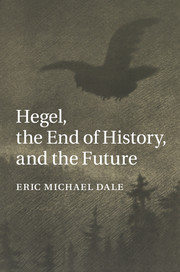Below are some of my published work and ongoing research, including the names and relative completeness of some other non-book projects.
 |
My first book in a three-part projected study of Hegel's thought. My book breaks new ground in Hegel studies by setting Hegel’s philosophy of history within the context of his overall body of work as well as showing its relationship to other writers on philosophy and history, specifically Herder, Fichte, Engels, Nietzsche, and Kojève. This book deals with his philosophy of history; book two will interpret his philosophy of religion, and the third, his political philosophy. The second book is written and being edited, with the projected title Towards Finite Theodicies: Hegel, Heidegger, Hölderlin.
Cambridge University Press published this book in September 2014.
|
"Dale's refutation [of the end of history idea] has the virtue of being both a very helpful excavation of the intellectual roots of how the "end of history" tag came to be attached to Hegel and of providing us, in its stead, with a novel account of the latter's world-historical teleology that is more consonant with the rest of his work." Anton Barba-Kay, The Review of Metaphysics. 68.4 (June 2015)
Read the full review here
"In this illuminating study, Dale argues that when understood in the broader context of his philosophy of history, Hegel's assertion of the end of history is not the outrageous claim that history has ended (something he explicitly rejects).... Dale's writing is accessible and free of jargon, and he is deft in his use of a broad range of sources, especially from 19th- and 20th-century Continental philosophy. This book will be of particular interest to students of Hegel's social and political thought." J.A. Gauthier, CHOICE: Current Reviews for Academic Libraries. 52.9 (May 2015)
Read the full review here
Buy the book on Amazon.com
View the publisher's webpage
Papers:
- "Bonaventure and Phenomenology: Transcendence and the Gift”
This paper is in revision.
- "Causal Efficacy and the Hermeneutical Experience"
This paper is in revision
- "Hegel and De Anima".
This paper is in preparation. It is an exploration of Hegel's statement in Enzyklopädie §378, "The books of Aristotle on the soul, along with his discussions on its special aspects and states, are for this reason still the most admirable, perhaps even the sole, work of philosophical value on this topic. The main aim of a philosophy of spirit can only be to reintroduce unity of idea and principle into the theory of spirit, and so reinterpret the lesson of those Aristotelian books".
- “God and the Philosophers: A Reply to Nichols and Jones” (2012) (.pdf)
Pacific Division Meeting, American Philosophical Association, Seattle WA, 7 April 2012. Panelist reply to David P. Nichols (Saginaw Valley State University), “The God of the Existentialist Philosophers: Fate, Freedom, and Mystery,” and Kile Jones (Claremont Lincoln University), “All the Consequences of This: Why Atheistic Existentialism is more Consistent than Religious Existentialism.”
- “Humanism and Despotism: Hegel and Jaspers on Chinese History and Religion”. (.pdf)
In Existenz: An International Journal of Philosophy, Religion, Politics, and the Arts. 5:1 (Spring 2010)
- “Hegel, Jesus, and Judaism”. (.pdf)
In Animus: The Canadian Journal of Philosophy and Humanities 11 (2006)
- "Hegel, Evil, and the End of History". (.pdf)
In History and Judgement, eds.A. MacLachlan and I. Torsen, Vienna: IWM Junior Visiting Fellows’ Conferences, Vol. 21 (2006)
- "Towards a Poetics of Place: Heidegger, Hölderlin, World, and Earth". (.pdf)
Given 20 March 2004 at “The Worldly Earth: An Ecological Conference,” Harvard University
Return
©2016 emdonline.org/Eric Michael Dale.
| |